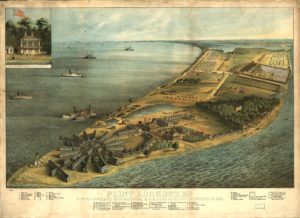James Forsyth, Berwick-on-Tweed
18 May 2022
James Forsyth moved across the River Tweed from his birthplace, Coldstream, Scotland, to Berwick-on-Tweed in England with his family as a small child in about 1842, and was a student there into the 1850s.
In 1861, by then a painter in Providence, RI, he enlisted in the 12th Massachusetts Infantry in Boston. He received a serious wound to his hand at Antietam and spent the next 9 months in Army hospitals and another year in the Veteran Reserve Corps before going home.
He was a painter to age 47, when he was killed in a railroad accident near his home in Lynn, Massachusetts, leaving a widow Isabella and 12 year old daughter Helen Eveline, the lone survivor of their 5 children.
The photograph here of part of the “old bridge” (built 1611-1634) into Berwick is from a promotional brochure [PDF] produced by English Heritage.
B. C. Brantley (c. 1865)
9 May 2022
Here’s a photograph taken just after the war of Benjamin Crawford Brantley (left), late Private of Company B, 13th Georgia Infantry.
He went by Crawford or Croff and was not yet 17 years old when he enlisted in 1861. He was wounded at Sharpsburg in 1862, at Gettysburg (1863), at Spotsylvania (1864), and finally, and most seriously, at Winchester, VA in September 1864. He lost his left forearm to amputation at a Federal field hospital in Winchester and was in the prison hospital at Point Lookout, MD to February 1865.
Which gives me a good excuse to show you this lovely 1864 bird’s-eye view of Crawford’s temporary home at Point Lookout. Click or touch to see more detail.
__________________
The photograph at the top was shared online by by Ken Brantley on his Brantley Association of America website. The other man is not identified.
This copy of the Point Lookout print is online from the Library of Congress.
George W Reaves’ pension application (1896)
8 May 2022
Private George Washington Reaves, 13th Georgia Infantry was about 30 years old when he was wounded in a most frightful way at Sharpsburg in September 1862. He later described it in his application for a Confederate veteran’s pension in 1896 (click to enlarge).
This helpful document is online from Georgia Archives Virtual Vault.




